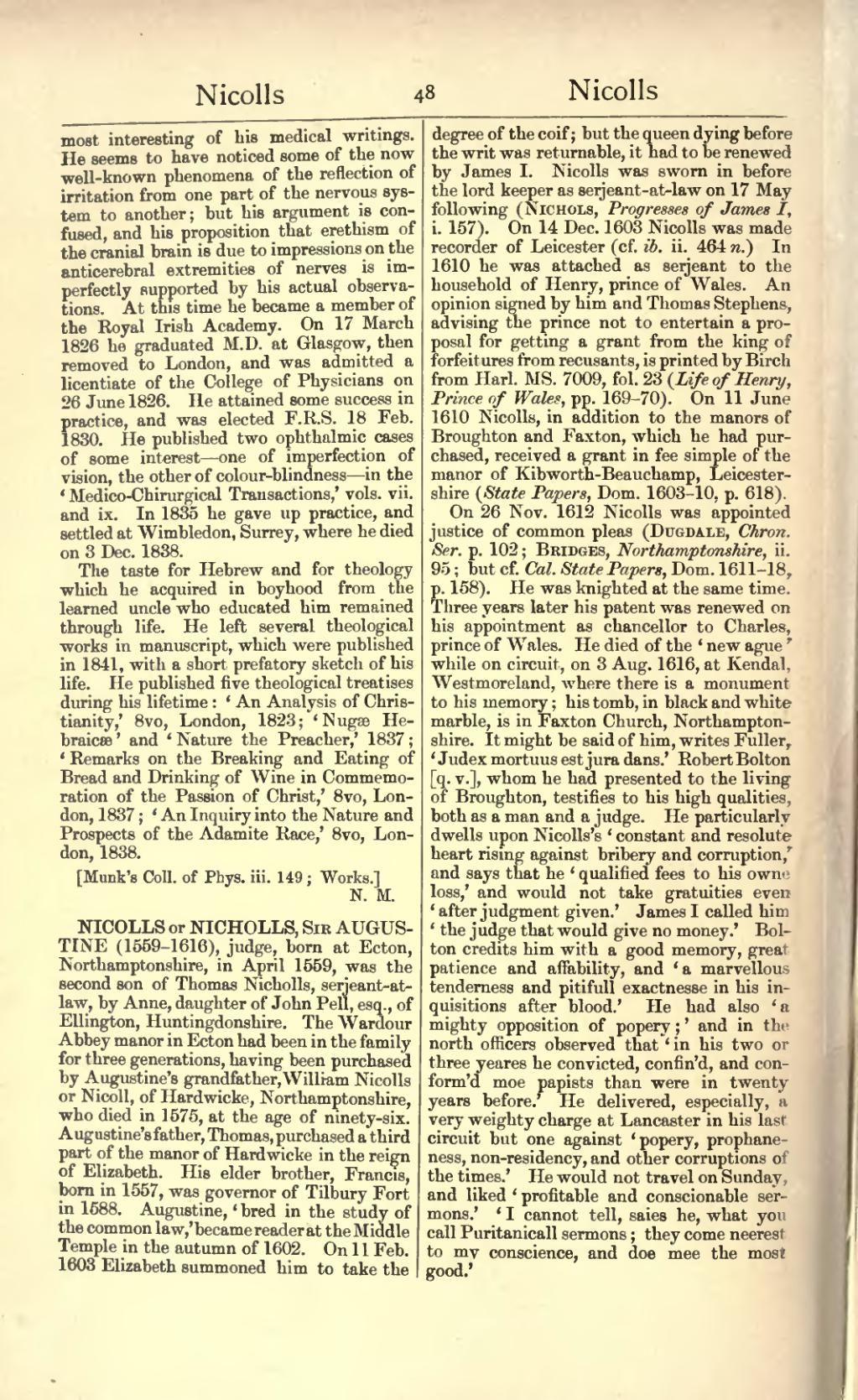most interesting of his medical writings. He seems to have noticed some of the now well-known phenomena of the reflection of irritation from one part of the nervous system to another; but his argument is confused, and his proposition that erethism of the cranial brain is due to impressions on the anticerebral extremities of nerves is imperfectly supported by his actual observations. At this time he became a member of the Royal Irish Academy. On 17 March 1826 he graduated M.D. at Glasgow, then removed to London, and was admitted a licentiate of the College of Physicians on 26 June 1826. He attained some success in practice, and was elected F.R.S. 18 Feb. 1830. He published two ophthalmic cases of some interest—one of imperfection of vision, the other of colour-blindness—in the ‘Medico-Chirurgical Transactions,’ vols. vii. and ix. In 1835 he gave up practice, and settled at Wimbledon, Surrey, where he died on 3 Dec. 1838. The taste for Hebrew and for theology which he acquired in boyhood from the learned uncle who educated him remained through life. He left several theological works in manuscript, which were published in 1841, with a short prefatory sketch of his life. He published five theological treatises during his lifetime: ‘An Analysis of Christianity,’ 8vo, London, 1823; ‘Nugæ Hebraicæ’ and ‘Nature the Preacher,’ 1837; ‘Remarks on the Breaking and Eating of Bread and Drinking of Wine in Commemoration of the Passion of Christ,’ 8vo, London, 1837; ‘An Inquiry into the Nature and Prospects of the Adamite Race,’ 8vo, London, 1838.
[Munk's Coll. of Phys. iii. 149; Works.]
NICOLLS or NICHOLLS, Sir AUGUSTINE (1559–1616), judge, born at Ecton, Northamptonshire, in April 1559, was the second son of Thomas Nicholls, serjeant-at-law, by Anne, daughter of John Pell, esq., of Ellington, Huntingdonshire. The Wardour Abbey manor in Ecton had been in the family for three generations, having been purchased by Augustine's grandfather, William Nicolls or Nicoll, of Hardwicke, Northamptonshire, who died in 1575, at the age of ninety-six. Augustine's father, Thomas, purchased a third part of the manor of Hardwicke in the reign of Elizabeth. His elder brother, Francis, born in 1557, was governor of Tilbury Fort in 1588. Augustine, ‘bred in the study of the common law,’ became reader at the Middle Temple in the autumn of 1602. On 11 Feb. 1603 Elizabeth summoned him to take the degree of the coif; but the queen dying before the writ was returnable, it had to be renewed by James I. Nicolls was sworn in before the lord keeper as serjeant-at-law on 17 May following (Nichols, Progresses of James I, i. 157). On 14 Dec. 1603 Nicolls was made recorder of Leicester (cf. ib. ii. 464 n.) In 1610 he was attached as serjeant to the household of Henry, prince of Wales. An opinion signed by him and Thomas Stephens, advising the prince not to entertain a proposal for getting a grant from the king of forfeitures from recusants, is printed by Birch from Harl. MS. 7009, fol. 23 (Life of Henry Prince of Wales, pp. 169–70). On 11 June 1610 Nicolls, in addition to the manors of Broughton and Faxton, which he had purchased, received a grant in fee simple of the manor of Kibworth-Beauchamp, Leicestershire (State Papers, Dom. 1603–10, p. 618).
On 26 Nov. 1612 Nicolls was appointed justice of common pleas (Dugdale, Chron. Ser. p. 102; Bridges, Northamptonshire, ii. 95; but cf. Cal. State Papers, Dom. 1611–18, p. 158). He was knighted at the same time. Three years later his patent was renewed on his appointment as chancellor to Charles, prince of Wales. He died of the ‘new ague’ while on circuit, on 3 Aug. 1616, at Kendal, Westmoreland, where there is a monument to his memory; his tomb, in black and white marble, is in Faxton Church, Northamptonshire. It might be said of him, writes Fuller, ‘Judex mortuus est jura dans.’ Robert Bolton [q. v.], whom he had presented to the living of Broughton, testifies to his high qualities, both as a man and a judge. He particularly dwells upon Nicolls's ‘constant and resolute heart rising against bribery and corruption,’ and says that he ‘qualified fees to his owne loss,’ and would not take gratuities even ‘after judgment given.’ James I called him ‘the judge that would give no money.’ Bolton credits him with a good memory, great patience and affability, and ‘a marvellous tenderness and pitifull exactnesse in his inquisitions after blood.’ He had also ‘a mighty opposition of popery;’ and in the north officers observed that ‘in his two or three yeares he convicted, confin'd, and conform'd moe papists than were in twenty years before.’ He delivered, especially, a very weighty charge at Lancaster in his last circuit but one against ‘popery, prophaneness, non-residency, and other corruptions of the times.’ He would not travel on Sunday, and liked ‘profitable and conscionable sermons.’ ‘I cannot tell, saies he, what you call Puritanicall sermons; they come neerest to my conscience, and doe mee the most good.’
